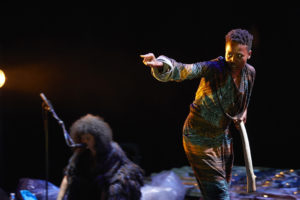Avignon: Unwanted. Symphonies of Pain part 1

Conception et chorégraphie : Dorothée MUNYANEZA –
Artiste plasticien : Bruce CLARKE –
Musique :
Holland ANDREWS –
Alain MAHÉ –
Dorothée MUNYANEZA –
Scénographie : Vincent GADRAS –
Lumière : Christian DUBET –
Costumes : Stéphanie COUDERT –
lieu: Villeneuve-lès-Avignon –
Photo: Christophe Raynaud De Lage
My journey through the Festival d’Avignon this year (20171) has just begun, but I have already decided to name my remarks The Symphonies of Pain, since the productions we have already seen and will be seeing speak to the issues of pain: how we encounter it, collectively or individually, either through history, or as a present day experience.
Inspired and troubled by the political, economic and humanitarian calamities that define our times, Olivier Py (the artistic director of the 71st festival) asks one major question: what role should the performing arts assume today as they try to reflect and resist our age of darkness? Dorothée Munyaneza’s one-woman solo-concert Unwanted is a perfect example of how a politically engaged artist can artistically respond to Py’s question.
Born in Rwanda, Munyaneza left Kigali in 1994 at the age of 12 to find a new home in London where she began her commemorative journey through the history of her country, its wars and genocide. A multimedia artist, working at the crossroads of song, dance, poetry, and visual arts, Munyaneza created a piece entitled Unwanted. It is based on the stories of violence and genocide in Rwanda that focus our attention on the children of rape and their mothers, forever marked by this violent act because they have been ostracized by their families and the world.
In the centre of Munyaneza’s theatrical investigation is the female body, its vulnerability and its sacredness. Inspired by the work of Svetlana Alexievitch, a Belorussian activist writer, and the filmmaker Thierry Michel, Munyaneza traveled to Rwanda to conduct interviews with victims of rape and their children. All are now forced to live in silence because of the shame of their experience. Their dignity and their inner beauty, Munyaneza explains, moved her enormously, so she decided to commemorate these victims’ suffering and to showcase their spiritual force through a work of theatre. What started as a solo-piece turned into a symphony of pain with Holland Andrews, an African-American singer, working alongside Munyaneza, creating a soundscape of special ambiance and urgency to convey the pain of these abused women.
The stage presents an empty space of mourning with Bruce Clarke’s sculpture – a transforming and movable 3D pillar where the silhouette of a beautiful African woman is tinted at its centre. Alain Mahé, another musician-collaborator of Munyaneza, operates the mix at his table located off stage, near the spectators. A woman approaches the table and takes a microphon; she gives us the name of the victim and tells her tale in French, as this woman’s testimony is played out in the language most of the Avignon audiences would not recognize.
The performer slowly transforms into this victim and into her child, crossing the divide between the spectators and the stage, between the things possible to imagine and those we cannot. What begins as a contrapuntal exchange of voices unfolds into the a-tonal symphony of music, popular songs, percussions, screams and screeching, disconnected speech and throat singing, stamping of feet and clashing of stones, and the beating of drums. The audience is mesmerized: what seemed to begin as a text-based documentary theatre performance about Rwanda’s genocide, turns into a requiem of disconnected and disturbing sounds intended to remind spectators of our own precariousness; and so we remain defenceless against the aggression of estrangement and hostility produced by this soundscape.
There are moments of silence as we listen to the victims’ words spoken in different languages. There is a monologue of a child looking for her father. She is the unwanted child, conceived in hate, and never loved by her mother, so the circle of carnage closes in on itself.
The strength and the aggression of this play’s content and its score are all extremely troubling. This work tells us that it produces violence, nothing else, a point well illustrated through the atmosphere of anxiety, fear, and physical discomfort that Munyaneza creates.
In French, with Holland Andrews, Alain Mahé, and Dorothée Munyaneza
July 7 -13, 2017, Chartreuse de Villeneuve lez Avignon.